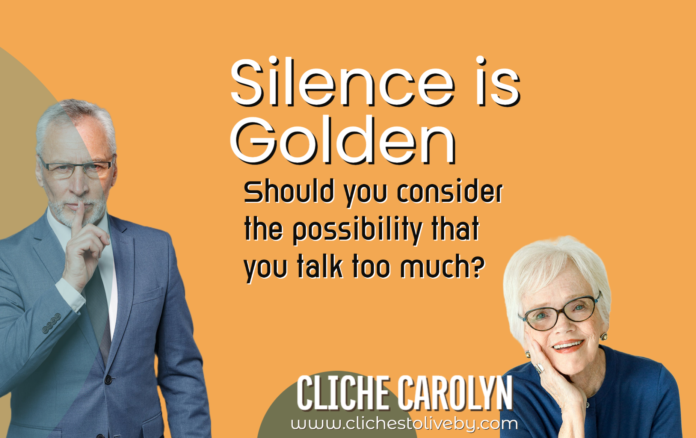Dr. Carolyn Lee dives into a different cliché each week. Recently, in her blog, “There’s No Accounting for Taste,”she quetsions the weight of subjective opinions. This week Carolyn explores the cliché, silence is golden.
Learn more about Dr. Carolyn Lee on her biography page or investigate 29 more clichés in her latest book, Keep Your Eye on the Ball And Other Clichès to Live by.
Silence is Golden
I met three friends for lunch at a local restaurant today. Just behind us was a round table at which were seated seven people who screamed at each other and shrieked with laughter for the entire hour-and-a-half my friends and I attempted to converse and eat our chicken club salads. As it turned out, we were screaming, too, in an effort to be heard above the din. As it turned out, everyone in the restaurant was screaming in order to be heard above all the other people who were screaming. This, I have learned, is a standard, across-the-board experience in most eating establishments, and, for someone of my delicate sensibilities and acute hearing, it is the thing that will finally make it impossible for me to dine out.
Now, of course, people gathering together for lunch are going to talk to each other. Too much silence at that table would have been awkward. But it sounded to me as if they were engaged in a competition of some sort for who could talk the most and the loudest, who could be the funniest, who could tell the best story.
I have read that the original idiomatic expression was “Speech is silver; silence is golden.” It most likely originated in Arabic culture, where it was used as early as the 9th century. So, we’ve been saying this particular expression for a very long time, and it’s probably been a cliché for several thousand years. I don’t know about the preferences of the 9th century population, but my observation is that the current general public much prefers silver to gold. Certainly, silence and any version of quiet are rare commodities.
Last weekend I watched the second half of a football game with the sound turned to zero. Why? Because the two commentators never stopped talking. I mean, never. And I mean talking at a high volume, up-tempo, high-pitch level that, I’m sure, sincerely conveyed their excitement, but which was more than I could handle. It was as though they had pledged to avoid so much as a moment of silence. On and on they went, analyzing every play, providing back stories about the players, rattling off statistics, making guesses about the “momentum,” drawing diagrams of the wide receiver slant and the reverse flea-flicker, questioning the play-calling, predicting the future. You might say, “Well, that’s what they’re hired to do.” You might also say, “If you don’t like it, there’s always the mute button.” And you would be right on both counts. Still, by half-time, I was so tired of their voices, so longing for just a moment of silence, a bit of quiet, that I was forced to end their performances.
I’m always amazed by the frequency, the duration, and the relentlessness with which people talk. A handyman comes to my house to patch a crack in the wall of my dining room. I ask him, “How does one become a handyman, anyway?” And that’s good for a forty-five-minute, non-stop discourse on the history of his professional life. Or I’m sitting at a dinner table and someone announces, “Oh, I have to tell you about this funny thing that happened yesterday.” But in order for us fully to understand the funny thing that happened yesterday, he must go back to an incident that happened two weeks ago and gradually make his way to yesterday’s funny thing. In so doing, he mentions a number of people we don’t know and provides a half-dozen details that really don’t have anything to do with the crux of his story. By the time he gets to the punchline, his listeners have grown impatient and lost track of the point altogether.
And what is my point? I think we talk too much. Excessive talking at one end of the scale can be the result of a personality disorder that might require the attention of a psychotherapist. That’s not what I’m referring to here. At the other end of the scale, it is an idiosyncratic, compulsive behavior that is not out of the control of the perpetrator. Why do we do it? First there is the simple reason that all human beings have a hunger to be listened to. Also, I read recently that the process of talking about ourselves releases dopamine, the pleasure hormone. Talkative people can’t seem to stop talking because they become addicted to that pleasure.
Avoiding the tendency to talk too much requires self-awareness and willpower. It also demands that talkers consider the needs of their listeners and involve them in the conversation. Mark Goulston, a business psychiatrist who specializes in listening suggests that we ought to limit ourselves to about forty-seconds of uninterrupted speech before actively engaging the other person in what should be a conversation, not a monologue. How do you know when your forty-seconds are up? The glassy-eyed expression on the face of your listener would be one indication.
What’s after Silence is Golden?
Check out Dr. Carolyn Lee’s blogs on her website, she features a new cliché each week or you can order her new book, Keep Your Eye on the Ball And Other Clichès to Live By. Curious about the author? Read more about Carolyn here. We hope you enjoyed this article learning more about the cliché, silence is golden.













Your ending made me laugh out loud. What a great way to start my day! Thanks.